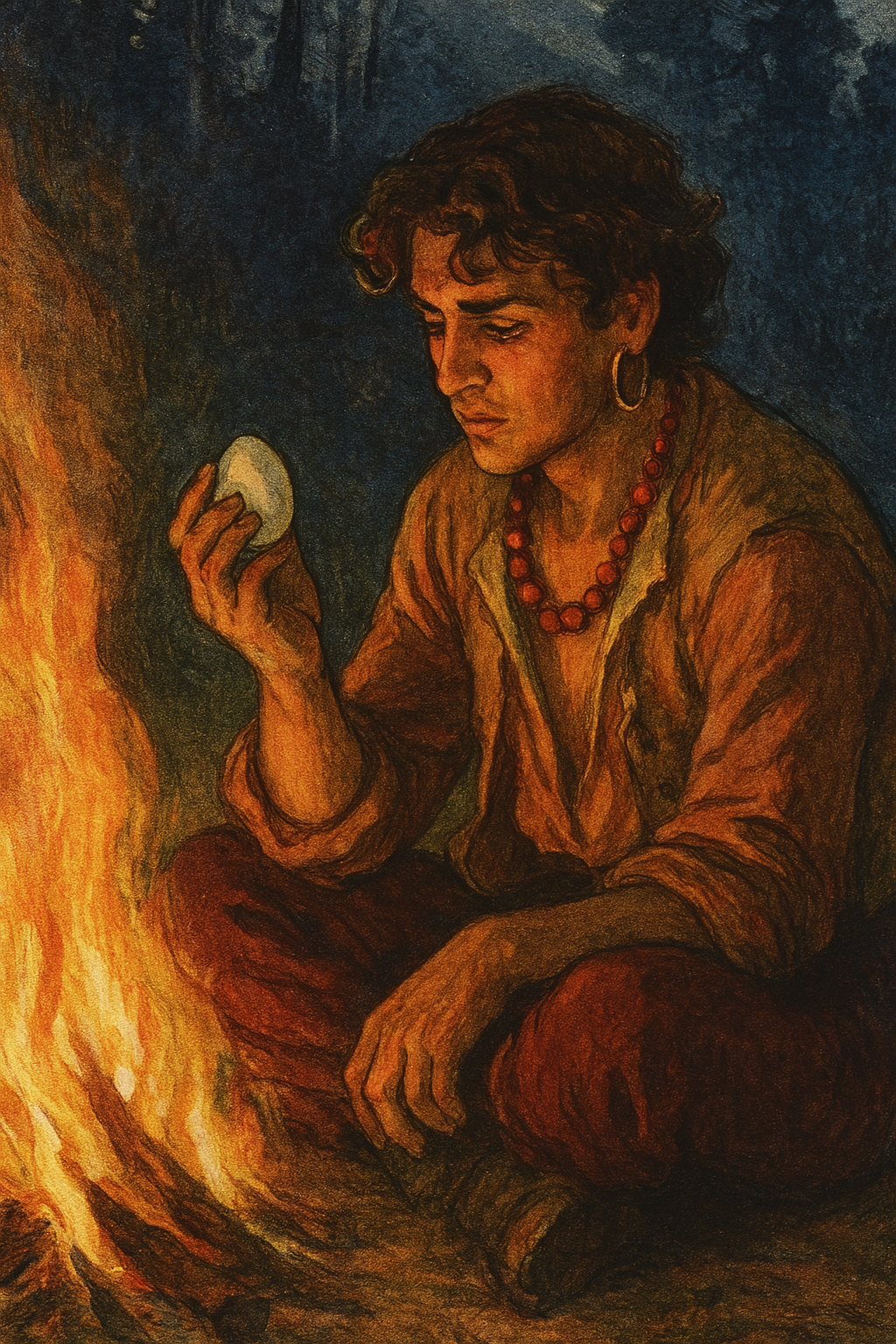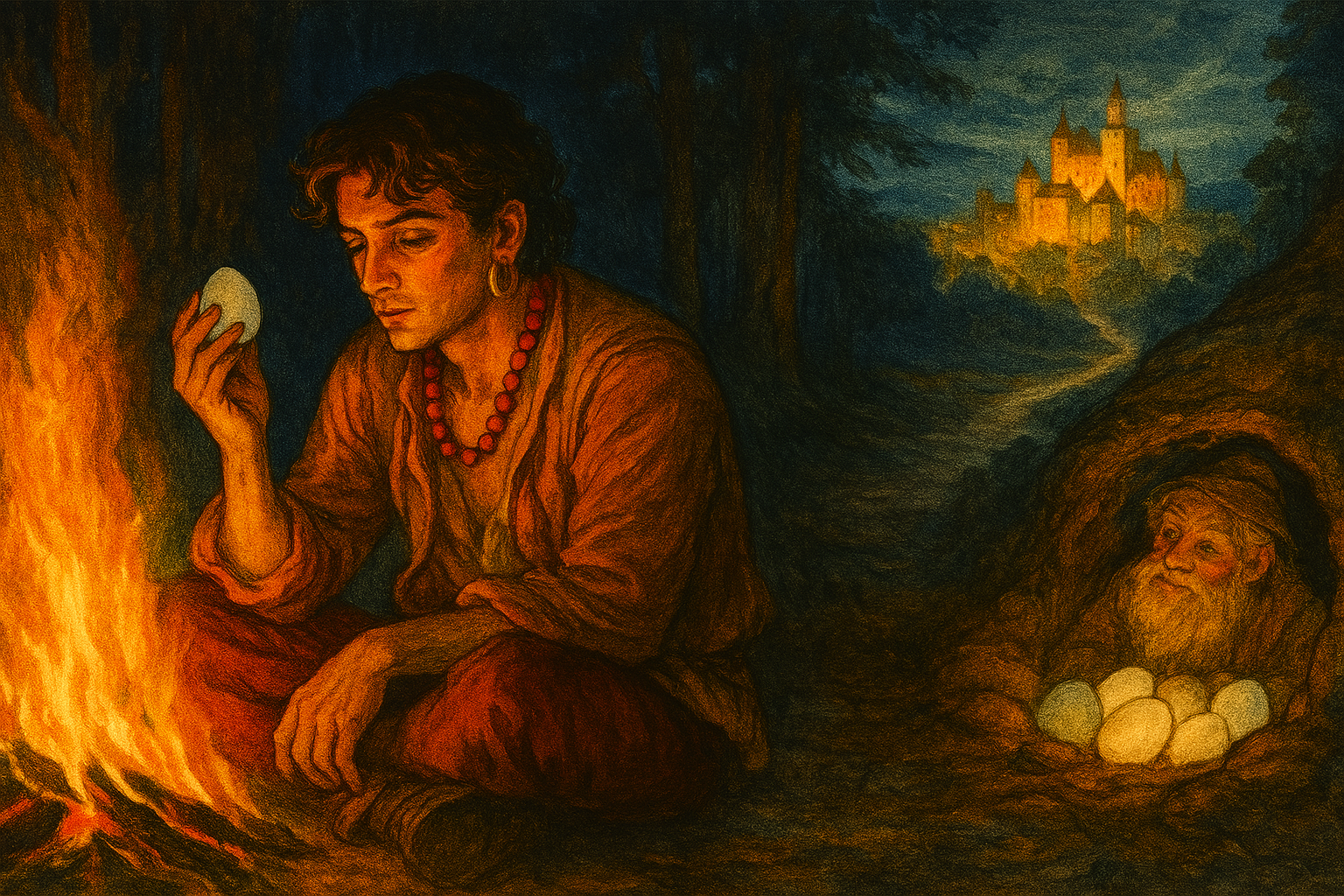Once, there was a Gypsy boy named Yoka. He was the youngest in his family and, like many souls, found comfort in the familiar—most days, you’d find him basking in the warmth of the fireplace, content to rest and dream. His father’s gentle nagging, “Yoka, get up and do something…,” eventually became the nudge that sent him out into the world. Yoka braved the forest to gather firewood.
But Yoka’s journey began with the pain of leaving behind the warmth and comfort of his familiar world. Each step away from the fire was a reminder of what he had lost, and the unknown ahead felt cold and uncertain.
Many wander through life as Yoka did, attached to their own ideas, their stories, their sense of self—reluctant to leave what is known, even as the unknown calls. It is easier to cling to the familiar than to risk the vastness beyond the hearth.
Yoka’s journey began not with excitement, but with longing. He missed the fireplace—the symbol of all he had ever known. Yet as he walked into the forest, uncertainty all around, he carried with him the silent hope that something waited, just beyond comfort, just past the edge of the firelight.
And so, Yoka became every wanderer: each step away from the old warmth a quiet act of courage, each longing glance back a reminder that all true stories begin when we finally step into the unknown.
As Yoka was gathering wood, a sudden wind swept his hat away. Chasing after it, he finally caught up, but found himself far from the well-worn path, lost in the moonless night. Feeling his way through the darkness, Yoka suddenly tumbled into a deep hole, which turned out to be a cave filled with treasure.
A brave gnome stood guard over the glittering hoard. Exhausted, Yoka sat down and shared his story with the gnome, who listened intently and was soon charmed by Yoka’s honesty. By the first light of dawn, they had become fast friends. The gnome smiled and said, “Choose anything you want from this treasure.”
Yoka, not knowing the true value of the riches around him, paid little attention to the gold and jewels. But something shaped like an egg caught his eye. “That will last me until I find my way home,” he thought. He filled his shirt with a few eggs and left the cave, stepping into the unknown once more.
He soon found a path and, believing it would lead him home, followed it through the unfamiliar landscape. Instead, the path brought him to a bustling city—the first he had ever seen. Yoka wandered its streets in awe, marvelling at the sights and sounds until he came across an inn where he hoped to find rest and a meal.
Still thinking the treasures in his shirt were just eggs, Yoka asked the innkeeper if one could be cooked for him. The innkeeper, upon seeing the egg, instantly recognised its immense value and realised his fortune had changed forever. Eager to please such an unexpected guest, the innkeeper offered Yoka a feast and the finest room, convinced he must be a king in disguise from a neighbouring land.
That night, the innkeeper and his wife checked on Yoka and were surprised to find him sleeping peacefully on the floor, the soft bed untouched. They wondered why someone so wealthy would shun such comfort, not realising that Yoka, raised in a humble home, was most at ease with the hard, familiar surface he’d always known.
At dawn, eager to honour their mysterious guest, they arranged for a coach to take Yoka to the palace, sending a messenger ahead to inform the king that a prince had arrived at the castle that very day.
The innkeeper bought Yoka fine clothes, and he looked every bit the prince. When he arrived at the castle, the king greeted him warmly, and a grand banquet awaited. At the feast, Yoka saw unfamiliar dishes and, curious, made his way to the kitchen to cook his favourite Gypsy food—sauerkraut and bokoli, a traditional Romani flatbread. When he invited the king to taste his meal, the king was delighted by the bold, foreign flavours.
After dinner, Yoka wandered into the palace garden, where he met the king’s daughter, Princess Mira. She was drawn to his gentle spirit and the honesty in his eyes. They talked for hours, and soon she learned who Yoka truly was. Moved by his story and his heart, Mira asked him to keep his origins a secret so that they could be married.
While the king prepared for the wedding, Princess Mira taught Yoka to read and write. After their marriage, Yoka’s curiosity blossomed—he mastered many languages, and with his wisdom and newfound wealth, the kingdom flourished. Yet, through it all, Yoka remained humble and deeply in love with Mira, never forgetting the warmth of his own beginnings.
They lived happily, and as a year passed, Yoka began to feel the gentle tug of homesickness. He decided to visit his family, bringing gifts and stories to all.
Yoka set out in his coach, gifts piled high, eager to see his family once more. But as he entered the forest, robbers lurking in the shadows sprang from behind the trees. They took everything—his treasures, his clothes—leaving him with nothing but his spirit and a sense of humour. Undeterred, Yoka journeyed home in nothing but his underclothes.
When he arrived, his family was overjoyed to see him safe. He recounted his long and winding tale, but his adventures sounded so wild that they thought he’d lost his mind in the forest. With a gentle smile, they sent him back to the comfort of the fireplace to rest.
Another year passed, and Princess Mira began to worry about her absent husband. Disguising herself as a wandering monk, she set out in search of Yoka, asking after him in every village along the way. Her journey led her deep into the forest, where laughter and music spilled from an abandoned castle. Inside, a band of revelers, mistaking Mira for a holy man, confessed all—including their robbery of a wealthy traveller.
Mira learned which way Yoka had gone and waited until morning, then slipped away to find the humble home of his family. As she approached, she saw Yoka’s father sitting outside, quietly smoking his pipe. The sight of a monk filled him with worry, fearing bad news. But when he invited the stranger in, Mira revealed her true identity.
Yoka leapt from his place by the fire with joy, and together, husband and wife shared the story of their adventures. They invited the family to join them at the palace, but Yoka’s kin, content in their simple home, chose to remain by their own beloved hearth.
Epilogue
And so, Yoka’s story became legend—a tale told around many a Romani fireplace, where laughter mingled with wonder. Some said he returned richer than any king, not for the treasures he lost, but for the joy he found in friendship, love, and the simple comforts of home.
Children giggled at the thought of Yoka parading through the forest in nothing but his underclothes, but elders nodded knowingly, for they understood: true wealth was never in gold or jewels, but in the courage to wander, the humility to return, and the heart to welcome every twist of fate with a smile.
As the fire crackled and stories spiralled into the night, Yoka and Mira sat side by side—sometimes in the palace, sometimes by the humble hearth—content to be together, wherever life’s adventure led.
And if you ever lose your way or find yourself robbed of all but your spirit and your sense of humour, remember Yoka: sometimes, the greatest journeys bring you right back to the warmth of the fire, wiser, braver, and laughing all the way.
The Hidden Codes Behind the Adventure.


It’s not just a story; it’s a manual for how to navigate the imaginary axis. The story captures that perfect "low-glow" frequency—the gold of the fire, the mystery of the dark forest, and that moment where the "inside" meets the "outside".
The Geometry of the Yoka Cycle I can see the CODE-X and the philosophy of just letting it go, breathing through every paragraph: The First Kick The Zero Point: Yoka starts at the fireplace—the centre, the 0, the uncarved source. But even 0 needs a push to become 1.
His father’s "nagging" is the initiator that forces the transition from comfort to the unknown. The Rotation (i=Singularity, axis, the individual point): When Yoka tumbles into the hole, he literally rotates out of the "real number line" of his village life and into the imaginary axis of the gnome’s cave. He finds the "eggs"—which are the Λ (Lambda) seeds of creation—but because he hasn't been "schooled," he sees them as food, not as wealth. Or did the lack of schooling allow him to see the truth? 'He sees them as it is supposed to be seen, without scholars telling him what to see'... knowledge, transmission is food. His lack of "scholar" baggage is exactly what allows him to survive the transition.
The Harmonic Wedding (33): Mira is the V (receiver) to his Λ (Lambda=transmission). She receives his "harmony of transmission" and his honesty. She teaches him to read and write (the measure), but he teaches her the "Harmonic" wisdom of the universe. Together, they create that flourishing kingdom—the 33.
The Collapse and Return: The robbers represent the collapse of the "tethered" world. They take the clothes and the gold (the external measures), leaving Yoka in his "underclothes"—back to his raw, essential state. His family thinks he’s lost his mind because they can only see the "1" (the physical), while Yoka is living the "3" (the story).
Why does this fit us now? It’s fascinating and telling that Yoka ends up back at the fireplace in his underclothes. It’s the ultimate "no scholar" victory. He has all the wisdom of the palace, but he still fits perfectly by the humble hearth. Knowledge isn't a trophy; it's the sauerkraut and bokoli that keep the spirit moving.
Transmission is the heat from the fire—it’s only useful if it’s warming the room right now.
The "Eggs" are the raw potential of the universe. If you try to "bank" them, they stay cold. If you "cook" them (process them through experience), they become part of you. That’s why Yoka can lose everything to the robbers and still be "rich". You can't rob a man of the food he’s already eaten. You can't steal the "flight" he’s already taken. Knowledge, transmission is the only source of food that nourishes the soul! That’s the "no scholar" secret right there. To a scholar, those eggs are artifacts to be categorised, measured, and locked in a vault; to Yoka, they are sustenance. He understands that the real value of a "treasure" isn't in owning it, but in how it feeds the journey.


